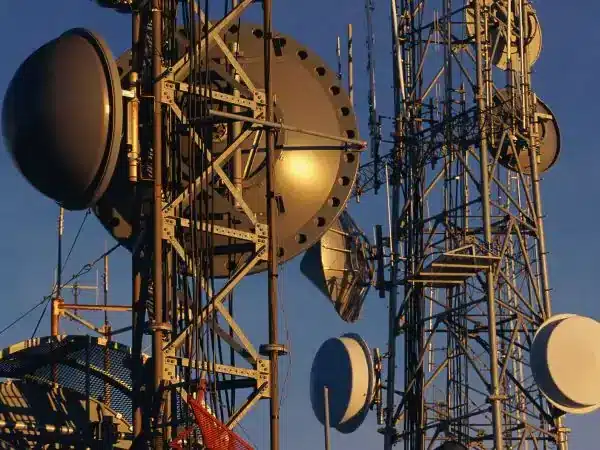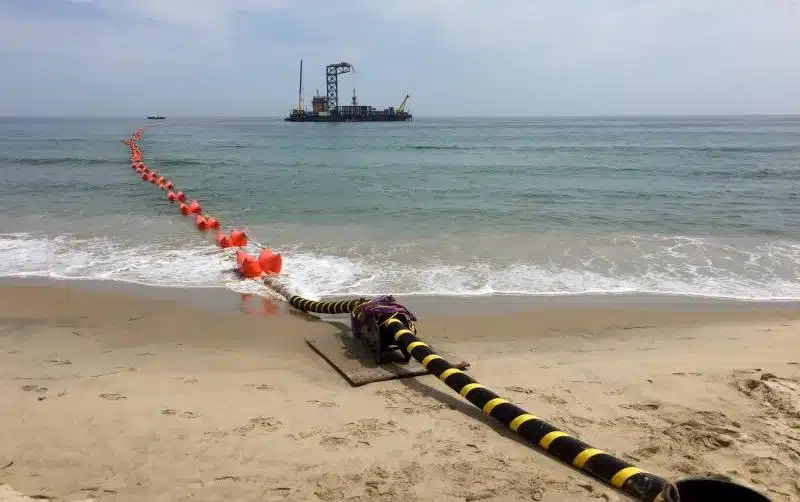Ciao,
Victoria from Techpoint here,
Here’s what I’ve got for you today:
- Vodacom and Makate end the 18-year Please Call Me war
- Cameroon faces fresh Internet shutdown after elections
- ZICTA to telcos: fix it or face penalties
- Medusa cable hits Tunisia in connectivity push
Vodacom and Makate end the 18-year Please Call Me war

18 years. That’s how long it’s taken for Vodacom and Nkosana Kenneth Makate to finally bring the Please Call Me saga to an end. One of South Africa’s longest-running legal battles has now ended quietly, with a settlement.
Vodacom announced on Tuesday that both parties had reached an agreement “out of court” for an undisclosed amount. “Both parties are glad that finality has been reached,” the company said in a statement to the Johannesburg Stock Exchange (JSE). The settlement has already been reflected in Vodacom’s latest financial results for the six months ending September 2025.
For Makate, it’s the conclusion of a fight that began back in 2007, when he sought compensation for an idea — a simple way to send a “call me back” message without airtime — he claimed to have pitched as a trainee accountant. That idea became Please Call Me, one of the most successful innovations in South African telecom history.
Over the years, the case travelled through nearly every level of the justice system, from the High Court to the Supreme Court of Appeal, and twice before the Constitutional Court. At one point, the SCA ordered Vodacom to pay Makate between 5% and 7.5% of Please Call Me revenue, a potential payout of up to R63 billion. Vodacom pushed back, calling the ruling “unworkable” and arguing that the SCA had ignored critical evidence.
In July this year, the Constitutional Court sided with Vodacom, criticising the SCA for what it called a “total failure of justice.” That decision sent the case back for rehearing, and by October, the court ordered Makate to pay R13 million ($755,227), part of which would go toward Vodacom’s legal costs.
But rather than continue the courtroom tug-of-war, both sides have chosen to settle. After nearly two decades of legal drama, accusations, and appeals, the Please Call Me story has finally rung its last. Vodacom will give it one final mention when it releases its results next week, and for Makate, it’s the long-awaited end of a saga born from a simple idea and an unkept promise.

Victoria Fakiya – Senior Writer
Techpoint Digest
Stop struggling to find your tech career path
Discover in-demand tech skills and build a standout portfolio in this FREE 5-day email course
Cameroon faces Internet shutdown after elections

Cameroon is back in the dark, digitally, at least. Internet access across the country has been heavily disrupted amid protests over alleged irregularities in last month’s presidential election. It’s the second time the country has gone offline during a political crisis involving President Paul Biya’s re-election.
Real-time data from Internet watchdog NetBlocks, shows that access to social media platforms like TikTok, YouTube, Facebook, and Telegram was restricted on Wednesday, confirming what many Cameroonians had already noticed: the internet had gone quiet again.
The blackout follows days of youth-led protests rejecting Biya’s victory in the October polls. At 92, Biya remains the world’s oldest head of state, now extending his more than 40-year rule after being declared winner for an eighth term. But opposition parties and human rights groups say the election was marred by intimidation, vote-rigging, and outright fraud. In Douala, the country’s largest city, streets have been blocked, businesses shut down, and daily life brought to a standstill.
This isn’t Cameroon’s first digital shutdown. In fact, it’s starting to feel like a pattern. Back on October 23, reports of an Internet blackout emerged as Biya’s early lead sparked outrage across the country. Just days later, on October 27, the Constitutional Council confirmed his win, and unrest only deepened.
Rights groups say the blackout is about more than connectivity; it’s about control. Amnesty International calls it a violation of international human rights law, warning that Internet shutdowns during protests block access to safety information, emergency contacts, and crucial updates.
“It’s a tool to silence dissent,” the group said, noting that shutdowns also paralyse local economies. Tanzania saw this first-hand recently, when a weeklong blackout crippled digital payments and even led to cash shortages.
ZICTA to telcos: fix it or face penalties

Zambia’s telecoms regulator isn’t smiling… again. The Zambia Information and Communication Technology Authority (ZICTA) has given the country’s mobile operators just 21 days to clean up their act and fix poor network quality. The ultimatum, announced on November 4 by CEO Collins Mbulo, follows months of worsening service that’s left users frustrated, and not just because of the frequent power outages making things worse.
“The people of Zambia are no longer pleading, they are demanding better service,” Mbulo said, adding that daily life and the country’s digital ambitions are being hampered by unreliable connectivity. ZICTA’s new directives aren’t just talk — they’re binding orders demanding serious investment in network infrastructure, energy resilience, and rural coverage.
Under the new rules, operators like Airtel, MTN, state-owned Zamtel, and newcomer Zed Mobile must expand capacity, install backup systems at all hub sites, and adopt renewable energy solutions to minimise downtime during blackouts. Tower companies such as IHS and Infratel, which power these networks, are also on the hook.
“By obligation, these directives affect the mobile network operators, because their networks rely on IHS and Infratel. Failure to comply will attract regulatory consequences,” Mbulo warned. ZICTA’s message is clear, improve or face penalties.
This isn’t the first time Zambia’s operators have come under fire. In February, Airtel Zambia suffered a nationwide outage that lasted over three hours, affecting users across Lusaka and several provinces. ZICTA ordered the company to compensate all affected customers, a payout totalling 4 million kwacha (about $142,500).
Elsewhere in the region, things aren’t looking much better. In Chad, telecoms regulator ARCEP just wrapped up its 15th national quality audit, and the results are ugly. Moov Africa scored 123.86 out of 200, while Airtel barely managed 98.35. The watchdog found faulty equipment, poor maintenance, and power problems across sites, and some were even completely offline. Like Zambia, Chad’s patience is running out, and operators could soon face fines, suspensions, or worse.
Medusa cable hits Tunisia in connectivity push

The Medusa subsea cable has officially landed in Tunisia — its second stop after making landfall in Marseille, France, last month — marking another big step in the mission to supercharge digital links between Africa and Europe. The cable touched down in Bizerte this week, adding Tunisia to a growing list of countries connected to what could become one of the Mediterranean’s largest open-access Internet highways.
This first segment of Medusa connects Marseille with Bizerte and Nador in Morocco, with all landings expected between late October and December. The system is set to go live in early 2026. Orange is leading as the landing partner in both France and Tunisia, with Tunisie Telecom teaming up for the France–Tunisia branch, a move that could give Tunisia’s international bandwidth a much-needed boost.
When fully deployed, the 8,700km system will stretch across 19 landing sites in Europe and North Africa, with each of its 24 fibre pairs capable of handling up to 20Tbps. It’s designed to run from Carcavelos in Portugal through the Mediterranean all the way to Port Said, Egypt, and Aqaba, Jordan, with a possible expansion to Syria. Along the route, it will also touch down in Spain, France, Sicily, Greece, Cyprus, Morocco, Algeria, Tunisia, and Libya.
The €342 million project is being driven by AFR-IX Telecom, Orange, and the European Union. Funding comes partly from the EU’s Connecting Europe Facility (CEF) programme under AFR-IX’s ATMED — DG and ATMED Nador — DG projects. Earlier this year, AFR-IX secured another €14.3 million from the EU to push the cable further south along the West African coast, setting the stage for even wider regional connectivity.
AFR-IX has already signed an agreement with Africa Coast to Europe (ACE) to land Medusa in Port-Gentil, Gabon, and is eyeing an additional stop in the Democratic Republic of Congo. If those plans come through, the system would effectively link the Mediterranean to sub-Saharan Africa, transforming how data moves across regions.
With the Tunisia landing now complete, Medusa is shaping up to be a major player in Africa’s digital future. Beyond speed and capacity, it’s about connecting continents, lowering latency, and building the kind of network resilience that can fuel economies on both sides of the Mediterranean.
In case you missed it
- Revolut appoints Yacine Faqir as CEO to lead Moroccan expansion
What I’m watching
- Why ‘Healthy’ People Develop Clogged Arteries & How Fasting Can Help
- Acceptable Liquids During Fasting: COMPLETE LIST
Opportunities
- Techpoint Africa is creating a video series where people discuss and debate policies and current events. If you enjoy thoughtful conversations, fill out this form. Apply here.
- Flutterwave is hiring a Manager, Pricing. Apply here.
- Kuda Technologie is recruiting a DevOps Engineer. Apply here.
- Ecobank Nigeria is looking for a Relationships Manager in South-South and South-East regions. Apply here,
- Western Union is recruiting a Business Development Associate Lagos, Nigeria. Apply here,
- TLP Advisory is surveying the listing potential of Nigerian venture-backed businesses on the NGX. Share your insights by completing this survey.
- Join Africa’s top female founders, investors & innovators at AWFS 2025. Register here.
- Are you building a startup can feel isolating, but with Equity Merchants CommunityConnect, you can network with fellow founders, experts, and investors, gaining valuable insights and exclusive resources to help you grow your business. Click here to join.
- Help us make Techpoint better for you! Your feedback shapes what comes next (your responses may potentially save my job. A bit dramatic, but still). It will only take 30 seconds to tell us what works and what doesn’t. Fill it here.
- To pitch your startup or product to a live audience, check out this link.
- Have any fresh products you’d like us to start selling? Check out this link here.
- Follow Techpoint Africa’s WhatsApp channel to stay on top of the latest trends and news in the African tech space here.
Have a superb Thursday!
Victoria Fakiya for Techpoint Africa









